Roof cladding sheets, often referred to as the armor of your home or business, play a crucial role in protecting structures from the elements. Whether you’re building a new structure or looking to upgrade your existing roof, roof cladding sheets offer durability, aesthetics, and functionality. This guide will take you through everything you need to know about roof cladding sheets, especially focusing on metal options. We’ll dive into corrugated iron sheets, explore various types of cladding, provide technical insights, and even walk through how to choose the right supplier.
Overview of Roof Cladding Sheets
Roof cladding sheets serve as the outermost layer of a roof, safeguarding the structure beneath from weather conditions, including rain, snow, and wind. Metal cladding sheets, specifically, are a popular choice for their longevity, strength, and resistance to corrosion. But there’s more to these sheets than meets the eye. They come in a variety of designs, materials, and finishes, each offering unique benefits and specific applications.
Whether you’re looking at aesthetic appeal, insulation capabilities, or structural strength, selecting the right cladding sheet involves a lot of considerations.
Key Features of Roof Cladding Sheets:
- Durability: Long-lasting protection against environmental factors.
- Aesthetics: Available in various finishes and profiles to suit architectural needs.
- Insulation: Certain materials offer thermal insulation, reducing energy consumption.
- Ease of Installation: Prefabricated sheets simplify installation.
- 低维护: Once installed, metal cladding requires minimal upkeep.
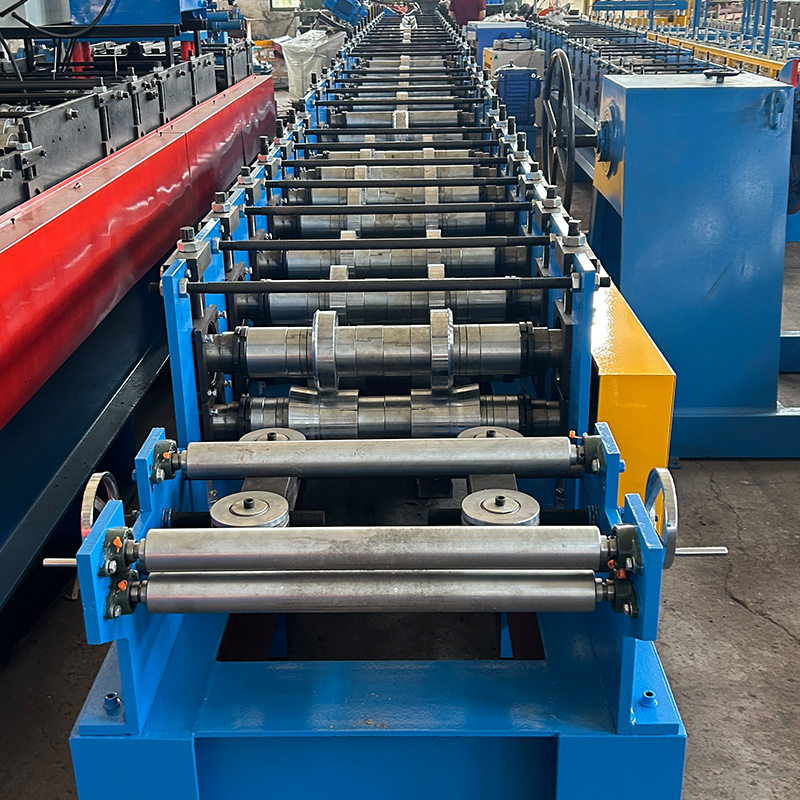
Corrugated Iron Sheets Guide
One of the most popular choices in roof cladding is corrugated iron sheets. They’re favored for their wavy profile, which not only enhances structural integrity but also ensures that rainwater runs off easily.
What Are Corrugated Iron Sheets?
Corrugated iron sheets are metal sheets with a repetitive wave-like pattern. Originally made from wrought iron, they are now most commonly made from galvanized steel or aluminum. The corrugated design strengthens the sheets, making them ideal for harsh weather conditions. The sheets are typically coated with zinc, which prevents rusting, making them a practical and economical choice for roofing in all climates.
Types of Roof Cladding Sheets
Roof cladding sheets come in various materials and forms. Let’s explore the most common types, focusing on their features and differences.
| Type | सामग्री | Main Features | 优势 | Disadvantages |
|---|---|---|---|---|
| Corrugated Metal Sheets | Galvanized Steel or Aluminum | Strong, wavy design; corrosion-resistant | Durable, cost-effective | Can be noisy during rain |
| Standing Seam Sheets | Steel, Aluminum, Zinc | Vertical seams for sleek appearance | Leak-resistant, modern look | Higher cost |
| Metal Shingles | Steel, Aluminum | Tile-like design | Aesthetic appeal, easy replacement | Higher installation complexity |
| Composite Metal Panels | Aluminum with plastic core | Lightweight, insulated | Excellent insulation, sleek finish | Expensive |
| Zinc Cladding Sheets | जिंक | Naturally weather-resistant | Long-lasting, self-healing properties | Costlier than steel |
| Aluminum Sheets | एल्यूमीनियम | Lightweight, corrosion-resistant | Rust-proof, low maintenance | Weaker than steel |
| Copper Cladding Sheets | कॉपर | Attractive, ages to patina | Long-lasting, aesthetically unique | Expensive, can tarnish |
| Fiber Cement Sheets | Cement, fiber | Mimics natural materials | Fireproof, moisture-resistant | Heavier, less flexible |
| Polycarbonate Sheets | Polycarbonate plastic | Transparent or translucent | Lightweight, high impact resistance | Can discolor over time |
| Bitumen Sheets | Bitumen with fiberglass | Flexible, waterproof | Affordable, easy to handle | Shorter lifespan |
How Roof Cladding Sheets Work
Roof cladding sheets are essential for providing weatherproofing and insulation to the structure. Here’s a step-by-step breakdown of how they work:
- Installation: Roof cladding sheets are usually installed over a substructure of rafters or battens. This frame provides support for the cladding and allows for proper water drainage.
- Waterproofing: The main function of cladding is to create a waterproof barrier, shielding the structure from rain, snow, and other forms of precipitation.
- Insulation: Depending on the type of cladding sheet, they may provide thermal insulation, keeping buildings cooler in summer and warmer in winter.
- Ventilation: The design of the sheets, particularly with standing seam or corrugated profiles, encourages proper air circulation, reducing the risk of condensation inside the roof space.
- Structural Support: Metal roof cladding adds strength to the roof, helping distribute weight and resist environmental stress, such as wind or snow load.
-
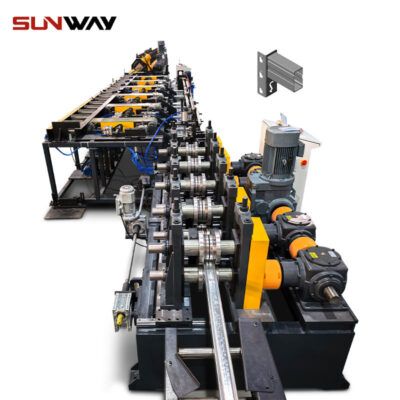 Storage Rack Shelf Box Panel Making Machine Steel Storage Rack System Box Beam Roll Forming Line
Storage Rack Shelf Box Panel Making Machine Steel Storage Rack System Box Beam Roll Forming Line -
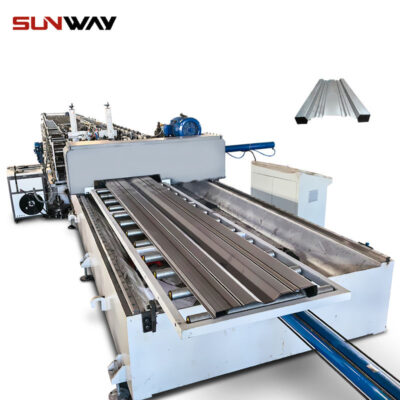 कैरिज बोर्ड रोल बनाने की मशीन
कैरिज बोर्ड रोल बनाने की मशीन -
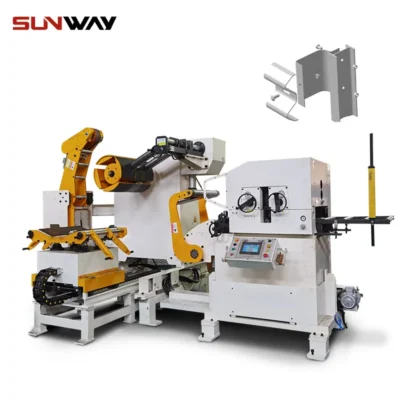 Highway Guardrail End Terminal Forming Machine
Highway Guardrail End Terminal Forming Machine -
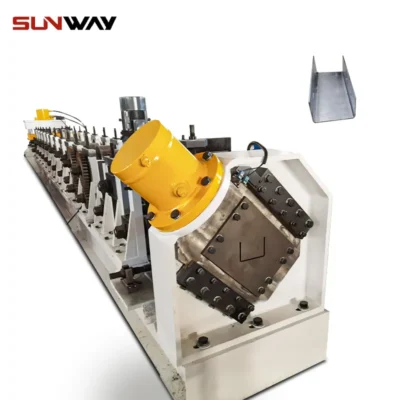 Highway U/C Post Roll Forming Machine
Highway U/C Post Roll Forming Machine -
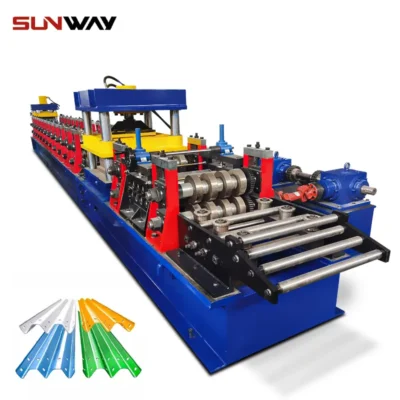 2 वेव्स हाईवे गार्डरेल रोल फॉर्मिंग मशीन
2 वेव्स हाईवे गार्डरेल रोल फॉर्मिंग मशीन -
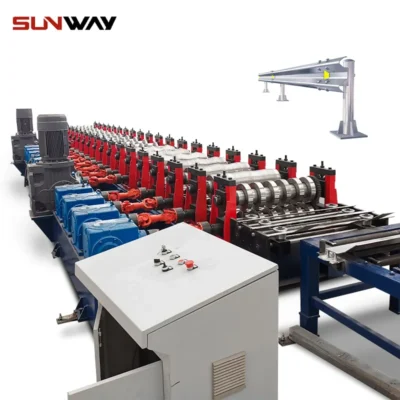 三波型高速公路护栏辊压成型机
三波型高速公路护栏辊压成型机 -
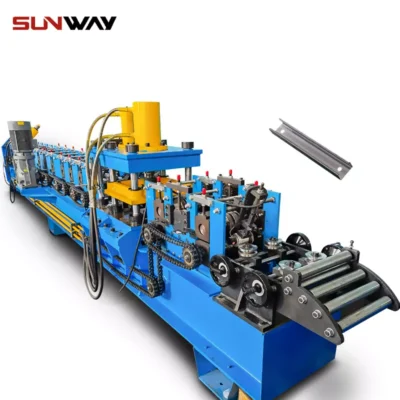 सी सेक्शन ब्रेसिंग ओमेगा स्टोरेज रैक अपराइट पोस्ट रोल बनाने की मशीन
सी सेक्शन ब्रेसिंग ओमेगा स्टोरेज रैक अपराइट पोस्ट रोल बनाने की मशीन -
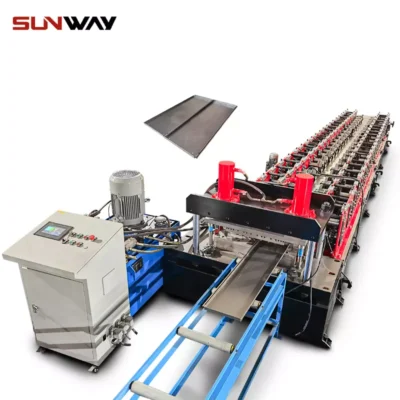 स्टील बॉक्स प्लेट रोल बनाने की मशीन बनाना
स्टील बॉक्स प्लेट रोल बनाने की मशीन बनाना -
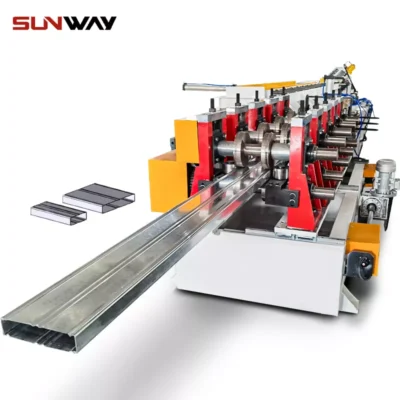 शेल्फ कॉलम के लिए बॉक्स बीम स्टील रोल बनाने की मशीन
शेल्फ कॉलम के लिए बॉक्स बीम स्टील रोल बनाने की मशीन
Key Components and Their Functions in Roof Cladding
| Component | Function |
|---|---|
| Cladding Sheets | Primary layer for waterproofing and protection. |
| Fasteners | Secures the cladding sheets to the substructure. They must be corrosion-resistant. |
| Sealants | Provides waterproofing at joints or seams, preventing leaks. |
| Insulation Layers | Placed beneath the cladding to reduce heat transfer. |
| Rafters/Battens | Provides support for the cladding, ensuring stability. |
| Flashing | Prevents water ingress at roof edges, valleys, and junctions. |
| Guttering | Directs water runoff away from the roof and structure. |
Machine Speed and Efficiency in Roof Cladding Manufacturing
The production of roof cladding sheets involves sophisticated machinery designed for high-speed output and efficiency.
| Machine Type | 速度 | Efisiensi |
|---|---|---|
| रोल बनाने वाली मशीनें | 10-15 meters/min | High efficiency, continuous production |
| Cut-to-Length Machines | 6-10 meters/min | Precision cutting, minimal waste |
| Seam Welding Machines | 8-12 meters/min | Ensures airtight seams, especially in standing seam sheets |
| Punching Machines | 5-8 meters/min | Precise hole punching for fastener locations |
Customized Mechanical Parameters for Roof Cladding Sheets
Roof cladding sheets can be customized according to specific building requirements, ensuring optimal performance.
| Parameter | 定制选项 |
|---|---|
| Sheet Thickness | 0.3mm – 1.2mm |
| 型材设计 | Corrugated, standing seam, trapezoidal |
| Material Type | Galvanized steel, aluminum, zinc |
| Coating Type | Galvanized, polyester paint, PVDF |
| रंग | Custom RAL colors available |
| Length of Sheets | Tailored to project requirements |
Applications and Uses of Roof Cladding Sheets
Roof cladding sheets can be found across various sectors due to their versatility and protective capabilities.
| आवेदन | Sector |
|---|---|
| Residential Roofing | Housing and apartments |
| Industrial Buildings | Warehouses, factories |
| : Provide support and stability for roofs against loads and weather. | Barns, silos, greenhouses |
| Commercial Spaces | Retail stores, shopping centers |
| 机构建筑 | Schools, hospitals, government buildings |
| Public Infrastructure | Bus shelters, train stations |
Installation, Operation, and Maintenance of Roof Cladding Sheets
Proper installation, regular operation checks, and maintenance routines are key to ensuring that roof cladding sheets perform optimally.
| Process | 描述 |
|---|---|
| Installation | Cladding sheets should be installed by professionals to ensure proper alignment, sealing, and fastening. |
| Operation | Regular checks for leaks, corrosion, or damage, especially after extreme weather events. |
| Maintenance | Clean gutters regularly, inspect for rust or damaged fasteners, and reapply sealants where necessary. Most metal cladding requires minimal upkeep. |
Suppliers and Price Range of Roof Cladding Sheets
When considering suppliers, ensure they offer a variety of materials and customization options.
| Supplier | Materials Offered | Price Range (per m²) |
|---|---|---|
| ABC Metal Roofing | Corrugated steel, aluminum | $12 – $25 |
| BlueScope Steel | Zincalume, galvanized steel | $15 – $28 |
| Kingspan Group | Insulated composite panels | $35 – $60 |
| Tata Steel | Color-coated steel, zinc | $10 – $30 |
| Metal Sales Manufacturing | Aluminum, copper | $18 – $45 |
| ArcelorMittal | Galvanized steel, copper | $20 – $50 |
How to Choose the Right Roof Cladding Supplier
Selecting the right supplier involves more than just comparing prices. Here’s what to consider:
| 因素 | Considerations |
|---|---|
| Material Quality | Ensure they offer certified, high-quality materials suitable for your environment. |
| 定制选项 | Choose a supplier who can meet your specific customization needs. |
| Reputation | Look for customer reviews and industry certifications. |
| Delivery Time | Ensure timely delivery, especially for large projects. |
| After-Sales Support | Check if they offer warranty and post-installation services. |
| 价格 | Compare the price against the quality and service offered. |
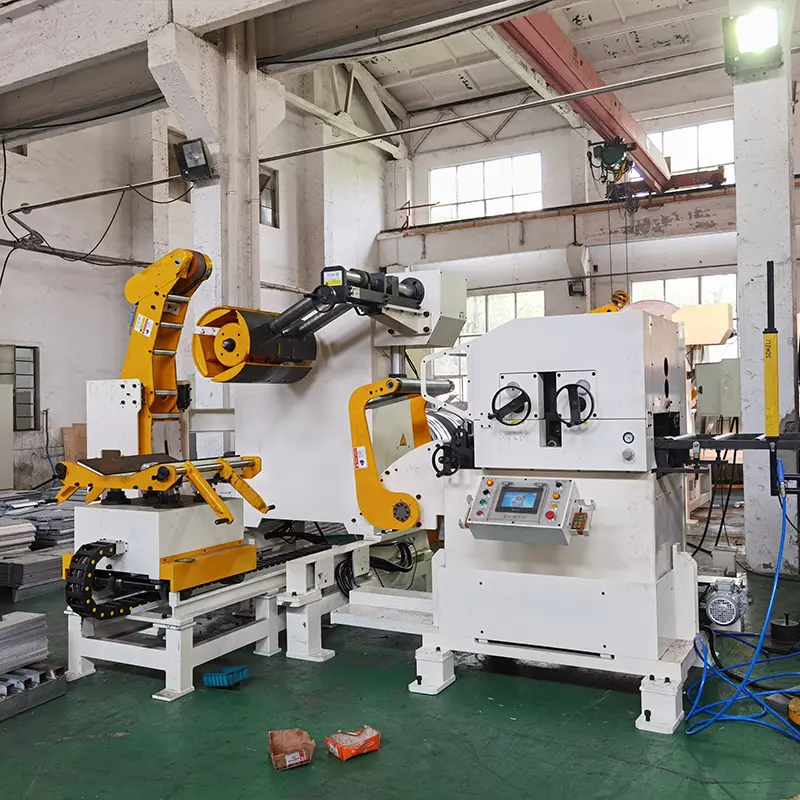
Advantages and Limitations of Roof Cladding Sheets
| Pros | Cons |
|---|---|
| Durable and long-lasting | Metal can be noisy during rain without insulation |
| Available in various designs and materials | Some types can be expensive |
| Low maintenance | Requires professional installation |
| Provides good thermal insulation | May dent or scratch in extreme conditions |
सामान्य प्रश्न
| Question | Answer |
|---|---|
| What is the best material for roof cladding sheets? | It depends on the environment. For coastal areas, aluminum or zinc may be better due to corrosion resistance. For colder climates, steel with insulation might work best. |
| Can I install roof cladding sheets myself? | While DIY installation is possible, professional installation is recommended to ensure proper alignment and sealing. |
| How long do metal cladding sheets last? | Depending on the material, metal cladding can last 40-70 years with minimal maintenance. |
| Do metal roof cladding sheets rust? | Galvanized and zinc-coated sheets are highly resistant to rust, but regular maintenance is advised to prevent corrosion. |
In summary, roof cladding sheets, particularly metal options, offer numerous benefits for various types of buildings. From their durability to aesthetic appeal, they are an excellent choice for both residential and industrial applications. Choosing the right material, understanding the working process, and selecting the right supplier are key steps to ensure a long-lasting and effective roofing solution.
